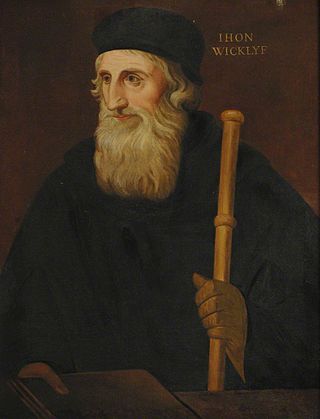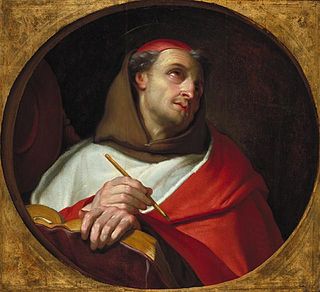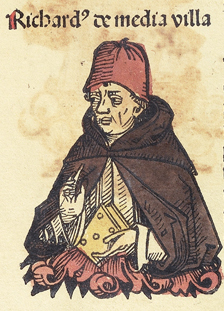Related Research Articles

John Wycliffe was an English scholastic philosopher, theologian, biblical translator, reformer, Catholic priest, and a seminary professor at the University of Oxford. He became an influential dissident within the Catholic priesthood during the 14th century and is considered an important predecessor to Protestantism. Wycliffe questioned the privileged status of the clergy, who had bolstered their powerful role in England, and the luxury and pomp of local parishes and their ceremonies.

Roger Bacon, also known by the scholastic accolade Doctor Mirabilis, was a medieval English philosopher and Franciscan friar who placed considerable emphasis on the study of nature through empiricism. In the early modern era, he was regarded as a wizard and particularly famed for the story of his mechanical or necromantic brazen head. He is sometimes credited as one of the earliest European advocates of the modern scientific method, along with his teacher Robert Grosseteste. Bacon applied the empirical method of Ibn al-Haytham (Alhazen) to observations in texts attributed to Aristotle. Bacon discovered the importance of empirical testing when the results he obtained were different from those that would have been predicted by Aristotle.

William of Ockham, OFM was an English Franciscan friar, scholastic philosopher, apologist, and Catholic theologian, who is believed to have been born in Ockham, a small village in Surrey. He is considered to be one of the major figures of medieval thought and was at the centre of the major intellectual and political controversies of the 14th century. He is commonly known for Occam's razor, the methodological principle that bears his name, and also produced significant works on logic, physics and theology. William is remembered in the Church of England with a commemoration on 10 April.

Scholasticism was a medieval school of philosophy that employed a critical organic method of philosophical analysis predicated upon the Aristotelian 10 Categories. Christian scholasticism emerged within the monastic schools that translated scholastic Judeo-Islamic philosophies, and thereby "rediscovered" the collected works of Aristotle. Endeavoring to harmonize his metaphysics and its account of a prime mover with the Latin Catholic dogmatic trinitarian theology, these monastic schools became the basis of the earliest European medieval universities, contributing to the development of modern science; scholasticism dominated education in Europe from about 1100 to 1700. The rise of scholasticism was closely associated with these schools that flourished in Italy, France, Portugal, Spain and England.

Bonaventure, born Giovanni di Fidanza, was an Italian Catholic Franciscan bishop, cardinal, scholastic theologian and philosopher.

John Peckham was a Franciscan friar and Archbishop of Canterbury in the years 1279–1292.
According to divine illumination, the process of human thought needs to be aided by divine grace. It is the oldest and most influential alternative to naturalism in the theory of mind and epistemology. It was an important feature of ancient Greek philosophy, Neoplatonism, medieval philosophy, and the Illuminationist school of Islamic philosophy.
Godfrey of Fontaines, in Latin Godefridus de Fontibus, was a scholastic philosopher and theologian, designated by the title Doctor Venerandus. He made contributions to a diverse range of subjects ranging from moral philosophy to epistemology. However, he is best known today for his work on metaphysics.

The Condemnations at the medieval University of Paris were enacted to restrict certain teachings as being heretical. These included a number of medieval theological teachings, but most importantly the physical treatises of Aristotle. The investigations of these teachings were conducted by the Bishops of Paris. The Condemnations of 1277 are traditionally linked to an investigation requested by Pope John XXI, although whether he actually supported drawing up a list of condemnations is unclear.

Richard of Middleton was a member of the Franciscan Order, a theologian, and scholastic philosopher.
Francis of Mayrone was a French scholastic philosopher. He was a distinguished pupil of Duns Scotus, whose teaching (Scotism) he usually followed.
Adam of Wodeham, OFM (1298–1358) was a philosopher and theologian. Currently, Wodeham is best known for having been a secretary of William Ockham and for his interpretations of John Duns Scotus. Despite this associational fame, Wodeham was an influential thinker who made valuable philosophical contributions during his life.
John Punch, O.F.M. (1603–1661) was an Irish Franciscan scholastic philosopher and theologian.
Bartholomew of Bologna was an Italian Franciscan scholastic philosopher. He was a follower of John Pecham.

Second scholasticism is the period of revival of scholastic system of philosophy and theology, in the 16th and 17th centuries. The scientific culture of second scholasticism surpassed its medieval source (Scholasticism) in the number of its proponents, the breadth of its scope, the analytical complexity, sense of historical and literary criticism, and the volume of editorial production, most of which remains hitherto little explored.
Catholic dogmatic theology can be defined as "a special branch of theology, the object of which is to present a scientific and connected view of the accepted doctrines of the Christian faith."

Medieval philosophy is the philosophy that existed through the Middle Ages, the period roughly extending from the fall of the Western Roman Empire in the 5th century until after the Renaissance in the 13th and 14th centuries. Medieval philosophy, understood as a project of independent philosophical inquiry, began in Baghdad, in the middle of the 8th century, and in France, in the itinerant court of Charlemagne, in the last quarter of the 8th century. It is defined partly by the process of rediscovering the ancient culture developed in Greece and Rome during the Classical period, and partly by the need to address theological problems and to integrate sacred doctrine with secular learning.

John Duns Scotus was a Scottish Catholic priest and Franciscan friar, university professor, philosopher, and theologian. He is one of the four most important Christian philosopher-theologians of Western Europe in the High Middle Ages, together with Thomas Aquinas, Bonaventure, and William of Ockham.
Blasius of Parma was an Italian philosopher, mathematician and astrologer. He popularised English and French philosophical work in Italy, where he associated both with scholastics and with early Renaissance humanists.
William of Luxi, O.P., also Guillelmus de Luxi or, was born in the region of Burgundy, France, sometime during the first quarter of the thirteenth century. He was a Dominican friar who became regent master of Theology at the University of Paris and a noted biblical exegete and preacher.
References
- Leen Spruit (1994), Species Intelligibilis: From Perception to Knowledge, pp. 235–7
- Jorge J. E. Gracia, Timothy B. Noone, A Companion to Philosophy in the Middle Ages (2003), pp. 626–9